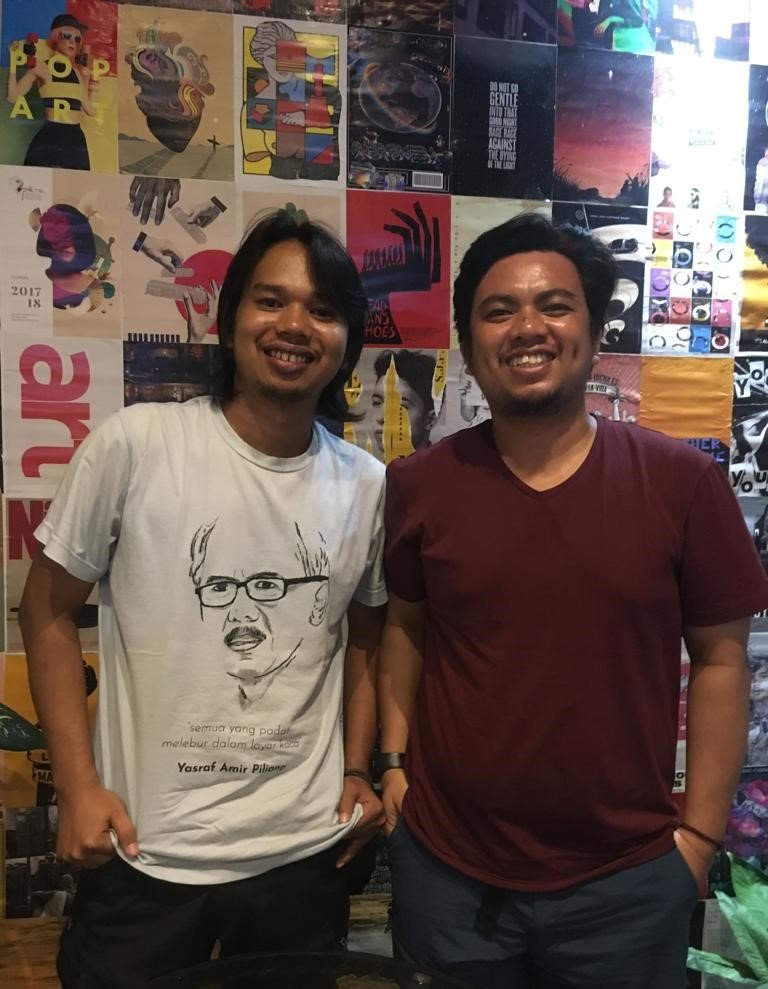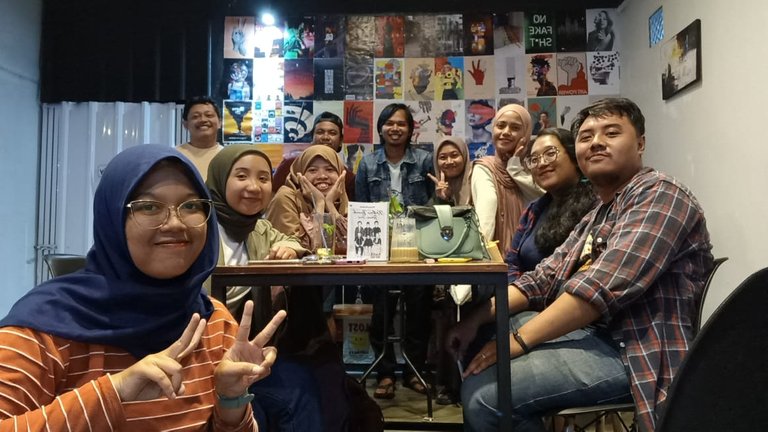I made a deal with that the process of education doesn't have to be limited to classrooms in institutions like campuses or schools. Even coffee shops could become knowledge universes that aren't bound by rigid curricula.
The clauses in accordance with the discussion of the 57th book titled Kabar Buruk Hari Ini (Bad News Today) a collection of journalistic coverage by Mawa Kresna, organized by the Klub Buku Main2 at Kineta Coffee & Public Sphere on Monday, July 10, 2023.
Mawa Kresna, being a journalist, he ain't only report events and captures the emotional side of tragedies and issues on the brink.
He brings the readers' imagination to the scene as if they were spectators of various sorrows and woes. Readers won't feel overwhelmed by a pile of information. In lieu, they will flow along with every concern and lamentation of the sources.
Dimas Prabu Yudianto, as the discussion mouthpiece, stated that journalism ain't just about reporting news but also making an impact on society.
He gave examples of Kresna's book openings that directly address sensitive issues in Yogyakarta, such as Susahnya Orang Tionghoa Punya Tanah di Jogja (The Difficulty of Chinese People Owning Land in Jogja) or the issue of discrimination against Papuans in Yogyakarta.
I could feel the expressed by Prabu and the writings of Kresna, that the primary duty of a journalist is to convey the truth, even if that truth is bitter.
In the book The Elements of Journalism by Bill Kovach and Tom Rosenstiel, in its latest edition, they outline ten principles of journalism. One of them states that the first call of duty of a journalist is to the truth.
This element of journalism could be interpreted as the act of reporting events or incidents in accordance with the facts on the ground.
The loyalty of journalism is to the citizens. In his book, Kresna becomes a journalist who takes the side of the community, standing with those who are oppressed by the system and hierarchy, and those who suffer in the name of development.
Despite that, of course, to write a journalistic piece, a journalist must be disciplined in verification. Therefore, in this discussion, we assent that writing a piece of feature news like what Kresna did ain't easy and requires time.
Then, Yosi Sulastri, one of the participants in the discussion, asked, "How could a journalist write a feature as brilliant as Kresna, taking into account the time-consuming verification process, while at the same time, journalists are pressured to chase deadlines and meet the set targets for straight news by the editorial team?"
Writing feature news is different from writing in-depth news, even though both convey in-depth information.
The difference lies in the way data is presented. Feature news presents data in a literary style, allowing readers to experience the emotions of the sources, evoking feelings of anger or even bringing them to tears.
By way of explanation, Kresna could vividly depict a person being intimidated by the police, with their head being stepped on and their nose being pulled.
It is through such descriptions that Kresna manages to evoke strong emotions in the readers, making his writing impactful.

Due to that, Prabu said, to answer Yosi's question, shared his own experience in producing a feature news.
As a contributor, Prabu said that he doesn't set a specific time target for writing feature news due the required time varies depending on the issue being addressed.
He even mentioned a time when he wrote an article covering the tomb of Mbah Setur, which took him up to three months to complete.

If we examine other elements of journalism, Bill Kovach and Tom Rosenstiel wrote that journalists should strive to make important things interesting and relevant.
In the past, almost no one knew who Mbah Setur was, also known as Kyai Setur. This descendant of Sri Sultan HB VII was almost forgotten by history orn't even recorded by history.
In the main, the people of Yogyakarta only knew that Dusun Seturan was the metropolitan area of Yogyakarta with more than 85 hotels and lodgings in the area and college campuses were also plentiful.
One of the prerequisites to becoming a good writer, based on Prabu, is to have a wide range of knowledge and to increase one's experience. Writing is a repetitive habit that forms an autopilot data bank in one's mind.
On the other hand, Zulkifli Mangaku, my best friend, is as well present in this discussion. He has landed in Yogyakarta to continue his journey to Jakarta. He is a colleague of Mawa Kresna.
In the opinion of Zul, be sure, writing feature news cannot be as quick as writing straight news. This is due to a feature writer needs to conduct in-depth field research.
For this reason, there are plus and minus each, especially since he is nowadays working as a freelance writer for various media outlets like Mongabay Indonesia, where he doesn't have a fixed salary but has the opportunity to write more feature articles.
The latest element in the book by Bill Kovach and Tom Rosenstiel is that citizens also have rights and responsibilities when it comes to news-related matters.
Discussing Kresna's book is one implementation of this element. We've got the right to criticize, monitor, and even reject perfunctory and clickbait news that is increasingly disturbing and lacks verification.
At the same time, heaps of press agencies and journalists no longer listen to their conscience when producing news and are solely profit-oriented.
This has resulted in a proliferation of sloppy news reporting that lacks comprehensiveness and proportionality.
Journalists no longer uphold the independence of their reporting subjects and no longer serve as a medium for public discussion (public sphere), let alone as independent monitors of power.
In the end, the book Kabar Buruk Hari Ini (Bad News Today) becomes good news. It is good news for silenced voices, for the unrest between the people and the authorities, and for those of us who thirst for truth and long for justice [mhg].